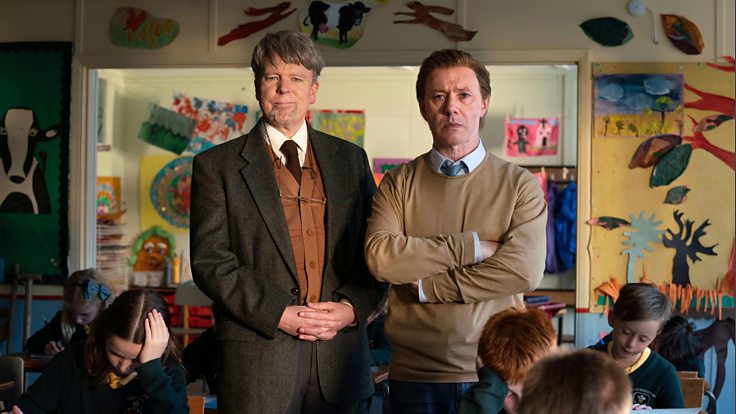Netflix viewers may soon have to pay the BBC licence fee – and I think it's a good idea
Making viewers of all stripes pay for Auntie would maintain standards across the board

UK Netflix viewers could soon have to pay the BBC licence fee. That's according to a recent Bloomberg report claiming that the UK government is considering the move as one option to keep funding the BBC.
It's not just Netflix viewers, though. Users of all video streaming services would be made to cough up, whereas currently you don't need to pay if you only participate in catch-up/on-demand viewing (and not on iPlayer). However, as we'll see, the current rules aren't quite that simple...
I say let's do it. And before you scream "But I didn't even watch The Traitors!" just hear me out.
Licence to bill

The rules, as they stand, take quite some getting your head around. Basically, you need a TV licence if you watch any programming that's broadcast live, or if you use iPlayer. That includes anything shown live on any platform (including online services like YouTube and streamers like Netflix). And you're liable to pay even if you don't own a TV but watch on a different device, like a smartphone or tablet.
You also need one if you record any live broadcast, whether that's on a DVR like Sky Q or even a VHS recorder (remember those?).
But if you only watch what's available on the likes of Netflix and YouTube and not live events, you don't need a licence. You can also watch other terrestrial catch-up services like ITVX and My5 without a licence (again, as long as you don't watch anything live).
There are discounts if you or someone you live with is severely sight impaired, or if you have a black-and-white TV (according to figures from last year, over 3500 UK households do, surprisingly), and for some other reasons.
Get the What Hi-Fi? Newsletter
The latest hi-fi, home cinema and tech news, reviews, buying advice and deals, direct to your inbox.
There's also an incredibly niche loophole that says that students whose parents own a licence, and who stay at their parents' house between term times, can watch without a licence at their term-time residence on a smartphone or laptop so long as it's not connected to an aerial or plugged into the mains. So charge your phone while watching and you'll technically require a licence. Seriously. It's on page four of this document.
Also, a communal TV licence won't cover individual rooms within a student hall of residence. So if a student doesn't live with their parents between terms, or their parents don't have a TV licence, they will need a TV licence for their room within a hall of residence, whichever device they're using to watch (and regardless of whether it's plugged into the mains or not).
Confused? I don't blame you. The rules have evolved to try and keep in step with the times – until 2016, you didn't need a TV licence if you only watched iPlayer and not live TV (what was known as the 'iPlayer loophole') – but in doing so have become ever more complex. Adding the charge to your Netflix bill could simplify this considerably.
To the ex-stream

Think about it: if you watch any streaming service, you must be at least slightly digitally savvy, so chances are you have watched at least some of the Beeb's output. I know there are those who might strenuously avoid it on purely ideological or moral grounds, and of course that's their right. But even if you go out of your way to avoid watching BBC TV channels, have you never listened to BBC Radio? Read the BBC News website? Looked up a recipe on BBC Food? Helped a young person with their studies using BBC Bitesize? Checked the weather on the BBC Weather app?
The licence fee funds all of this and more. Even if you do purposely avoid all of this content (and I would kind of admire you – that's quite some effort), I would argue that you still benefit from it. Having an impartial journalism outlet in BBC News (which isn't owned by vested interests or forced to rely on advertisers) is a boon to wider society in general. Even if you don't read it, chances are you will read or watch follow-ups on its scoops from other media outlets. It might not be perfect, but we would all be worse off without it.
So why not adopt a subscription model? That's what Prime Video, Netflix, Disney+ et al have to do, after all. If the BBC can't stand on its own two feet, surely it shouldn't exist at all, at least in its current form.
That would make the BBC compete on purely commercial terms, conflicting with its public service remit. It would inevitably mean a drop in funding, with compromises on BBC output. As anyone with kids will tell you, CBeebies and CBBC are hillocks of civility in the morass of YouTube / Nickelodeon / Blippy / Cocomelon. And all those news articles, recipes, and weather reports we've been taking for granted? They would be cut back severely, put behind a paywall, or forced to carry adverts. The BBC apps, websites and podcasts already have adverts when accessed abroad. Which makes you realise how annoying they are (the ads, that is, not the BBC content, though I'll make an exception for Robin Ince on The Infinity Monkey Cage).
Now, you can bet streamers like Netflix would pass on the charge to us viewers in a heartbeat. Which no one wants – US Netflix prices went up again recently, and are sure to rise in the UK again soon. Adding the licence fee on top would make streaming prohibitively expensive. But what's the alternative? Adding the licence fee to general taxation? That would have echoes of the poll tax, and we all know how popular that was. True, it could be linked to the size or type of your dwelling, like council tax, so wealthier people pay more, which I'm all for in principle. But the wealthy do have a habit of avoiding – or at least minimising – most taxes. I can see dollar signs in the eyeballs of all those accountants promising a more 'tax-efficient' way of managing your finances.
At least this way you are charging the people streaming, rather than those who genuinely have no digital footprint. In my view, it's the most sensible way forward – if the vast majority of us give a little, we all gain a lot.
Something has to change in the funding model if we want the BBC to not only survive, but thrive. At the moment, this looks like the least worse option.
MORE:
Check out the best streaming services for TV and movies
Life. Hack. How to (legally) watch all the streaming video services for the price of one
I pay for Amazon Prime Video, so why am I seeing ads?
Joe has been writing about tech for 20 years, first on staff at T3 magazine, then in a freelance capacity for Stuff, The Sunday Times Travel Magazine (now defunct), Men's Health, GQ, The Mirror, Trusted Reviews, TechRadar and many more. His specialities include all things mobile, headphones and speakers that he can't justifying spending money on.
-
fazalmajid You must be incredibly naive if you still believe BBC journalism is impartial. It has been pretty thoroughly been neutered and brought to heel by Cameron's and successive governments, and the political hacks they appointed like Richard Sharp.Reply
The BBC is a valuable instrument of soft power for the UK government, and thus some line items like the World Service (sadly cut to the bone) really should be paid out of the Foreign Office's budget.
Including the licence fee in the Netflix bill would mean people who are already paying the licence fee would be charged for it twice. -
MajorBloodknock Reply
What a joke! The BBC has no standards to maintain - it left behind impartiality and accurate, quality programming decades ago.What Hi-Fi? said:The government is reportedly considering charging Netflix viewers the BBC licence fee. I say go for it.
Why Netflix viewers should pay the BBC licence fee : Read more
Additionally, you are perpetuating the lie that the BBC Licence encompasses "anything live on streaming platforms", it does not. Youtube, Netflix, Amazon Prime etc are NOT broadcasters - this deliberately vague phrase, if true and was taken literally, would mean that the BBC would send around the boys if you watched individual content creators hosting live streams.
But then I'm not surprised legacy media companies, like Future Publishing, are defending their own kind...dinosaurs.
The BBC should be forced to into competing on a subscription model - we would soon see how much people actually value its content. By the same token, no one should shed a tear for the likes of Netflix when users leave - its content is hardly world class either! -
River What a bunch of baloney. The BBC isn't impartial and no one wants to keep paying for the BBC to line the pockets of the countless pedophiles they seem to employ. I tried adding my information sources here but whathifi thinks they are spam so you'll have to look it up yourself unfortunatelyReply
And to answer the question of even if you don't watch BBC do you listen? No I don't. I dont support the BBC in anyway. Dont watch it, don't listen to, and I even avoid any articles they write. They have an endless stream of sexual abusers and pedophiles that they seem to ignore/cover up until someone whistle-blows.
The writer of this article should stick to writing about headphones and speakers. Idiot -
unfocused You really think it's reasonable for people to pay (currently) £169.50 a year - a figure mysteriously omitted from your article - for a service they don't want or don't use? The idea that the BBC is a bastion of quality and integrity is long gone. The BBC is a bloated relic of the 20th century. Time to move on.Reply

